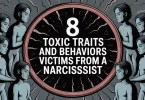Narcissists have extremely destructive characteristics, manipulative and hurtful, and they cause a lot of psychological and emotional damage to the people around them. The article presented here talks about the personality traits and behaviors of narcissists that define their destructive tendencies based on personal experience and observation, in describing their effects. The reasons listed below are major ones that define the actions of narcissists as extremely destructive, including their manipulation tactics and absence of empathy.
1. Deliberate Harm Driven by Jealousy and Envy
Narcissists often act out of jealousy, competitiveness, and envy, stemming from their fragile egos. They struggle to handle shame, criticism, or others surpassing them in any way. To compensate, they may deliberately undermine others to boost their sense of self-worth. This need to tear others down, rather than build them up, reveals a destructive mindset that prioritizes their ego over others’ well-being.
2. The Silent Treatment as Emotional Abuse
One of the most insidious tactics narcissists employ is the silent treatment, a form of emotional abuse designed to punish and control. By withholding communication, they aim to make their victims feel desperate, forcing them to beg for attention or reconciliation. This refusal to engage in healthy conflict resolution, choosing instead to “ice out” their target, demonstrates a calculated intent to inflict emotional pain rather than foster understanding or compromise.
Related Topics:
5 Proofs The Covert Narcissist is Running a Smear Campaign Against You
What is NARCISSIST ABUSE? Everything you need to know!
3. Invalidation and Lack of Support
Narcissists, particularly covert narcissists, frequently invalidate others’ feelings, accomplishments, or perspectives. They rarely offer compliments or acknowledge others’ successes, often responding with silence, a dismissive smirk, or by redirecting the conversation to themselves. This competitive nature ensures they never celebrate others’ achievements, instead seeking to one-up or belittle them, which undermines healthy relationships and emotional support.
4. Sadistic Pleasure in Others’ Pain
Some narcissists derive joy from others’ suffering, a trait that can border on sadistic. When someone is visibly upset or crying, a narcissist may remain indifferent or even display a subtle smirk, gloating in the other person’s pain. This lack of empathy is particularly evident when they fail to offer comfort, instead reveling in the distress they’ve caused or witnessed.
5. Abandonment in Times of Need
Narcissists often make empty promises to be there for others, only to disappear when genuinely needed. Whether someone is sick, in distress, or facing a crisis, narcissists may ghost their victims, leaving them feeling abandoned. Later, they may offer flimsy excuses or gaslight their victims to deflect responsibility. This deliberate absence during critical moments highlights their lack of care and willingness to let others suffer.
6. Mocking Physical or Emotional Pain
When someone experiences physical or emotional pain, such as falling or injuring themselves, a narcissist’s first response may be to laugh rather than offer help or concern. This reaction reveals their focus on the spectacle of the situation rather than the well-being of the person involved, further demonstrating their lack of empathy.
7. The Manipulative Smear Campaign
Covert narcissists are particularly adept at manipulating others against their target through smear campaigns and gossip. By portraying themselves as victims and their target as the aggressor, they isolate their victim, stripping away their support system. This tactic ensures that when the victim tries to expose the narcissist’s behavior, they are met with disbelief, as others have already been swayed. This calculated isolation is a powerful tool to break down the victim’s confidence and emotional stability.
8. Wasting Time and Exploiting Trust
Narcissists often enter relationships with false intentions, misleading others into believing they share the same goals or values. They may use people temporarily for their gain, only to discard them when they are no longer useful. This disregard for others’ time, a precious and irreplaceable resource, demonstrates a lack of respect for their victims’ lives and aspirations. Narcissists may linger in someone’s life, bouncing in and out as it suits them, exploiting trust without regard for the emotional toll.
9. Inducing Anxiety and Depression
Narcissists frequently leave their victims grappling with anxiety, depression, and diminished self-esteem. By constantly belittling, criticizing, or instilling fear, they erode their victims’ sense of worth, sometimes to the point of fostering suicidal thoughts. This ability to inflict profound psychological harm is a hallmark of their destructive behavior, as they thrive on creating chaos and distress in others’ lives.
10. Selective Kindness Based on Utility
Narcissists are often kind only to those who can benefit them, such as influential or wealthy individuals, while showing cruelty or indifference to those they deem “useless,” such as the poor, sick, or disadvantaged. This selective empathy reveals their self-serving nature, as they prioritize personal gain over genuine care or compassion. Such behavior contradicts values of kindness and support for the vulnerable, further underscoring their harmful tendencies.
Staying Grounded and Protecting Yourself
Dealing with a narcissist can be spiritually and emotionally draining, often leaving victims feeling broken. To counteract their influence, it’s essential to stay grounded in your values and trust your instincts. Your gut is a powerful guide; listen to it when it signals discomfort or danger.
Surround yourself with people who uplift and support you, and seek professional help, such as therapy, if needed, to heal from narcissistic abuse. Recognize that narcissists thrive on control and chaos, but you have the strength to break free by prioritizing self-care and discernment.
By understanding these behaviors, you can better protect yourself from the harmful effects of narcissists. Stay focused on your well-being, seek supportive relationships, and trust in your resilience to overcome their influence.







Leave a Comment